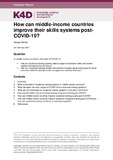How Can Middle-income Countries Improve Their Skills Systems Post- COVID-19?
Abstract
Vocational training systems in middle-income countries are going to face multiple challenges in the post-COVID era, notably, challenges related to (1) automation; (2) the transition to a green economy, and (3) demographic pressures. Of these, automation - linked to the burgeoning ‘fourth industrial revolution’ that is set to transform the global economy - represents the most serious challenge and is the only one of the three challenges discussed in any depth in this paper. Whilst estimates of the likely scale of automation in the coming years and decades vary widely, it appears likely that waves of automation will lead to a dramatic decline in many kinds of jobs that largely involve routine, repetitive tasks. These trends pre-date COVID-19, but the disruption caused by the pandemic provides an opportunity to prepare for these challenges by implementing vocational training system reforms as part of the Build Back Better agenda. Reforms to vocational training systems will be crucial to ensuring middle-income countries respond appropriately to accelerating labour market changes. However, they should only form a limited part of that response and need to be integrated with a wide range of other policy measures. Vocational training reform will need to occur in the context of major reforms to basic education in order to ensure that all workers are equipped with the cross-cutting cognitive and socio-emotional skills they will require to perform hard-to-automate tasks and to be able to learn and adapt rapidly in a changing economy. Middle-income countries will also likely need to progressively expand social protection schemes in order to provide a safety net for workers that struggle to adapt to changing labour market requirements.
Citation
Herbert, G., (2021). How can middle-income countries improve their skills systems post-COVID-19? K4D Helpdesk Report 957. Brighton, UK: Institute of Development Studies. DOI: 10.19088/K4D.2021.082DOI
10.19088/K4D.2021.082Is part of series
K4D Helpdesk Report;957Rights holder
© Crown copyright 2021Sponsor
FCDO (Foreign, Commonwealth and Development Office)Collections
- K4D COVID-19 Resources [213]

